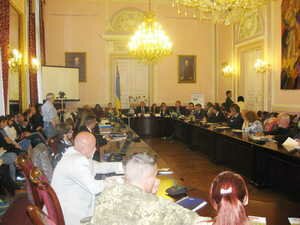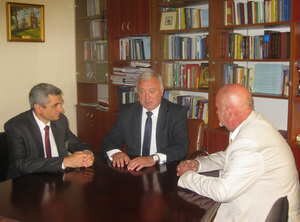
"The Vigour on the Way to NATO and the EU as a Guarantee of Security of Ukraine in the Condition of the Russian Federation's Armed Aggression"
Speech by Yuriy Radkovets — Vice-President of the Independent Analytical Center for Geopolitical Studies “Borysfen Intel”, Ph.D. in Military Science, Associate Professor, Lieutenant General (ret) — at the conference “Implementation of NATO Standards in Ukraine: Achievements and Prospects”.
The materials of the Independent Analytical Center for Geopolitical Studies “Borysfen Intel” has repeatedly raised the issue of how to address the problems of European and Euro-Atlantic integration of Ukraine in a tough counter to these processes on the part of Russia. However, the continuation of a cynical Russian armed aggression against Ukraine, as well as the threat of invasion scale Russian terrorist forces deep into the territory of Ukraine, demand from the Ukrainian side more decisive steps to speed up the process to guarantee the security of the country.
First of all it concerns the political will and the political decision-making and implementation of real practical steps to obtain Ukraine's membership in NATO and the EU. Resolving this issue is crucial not only for Ukraine but also for the Alliance and the European Union and in the mutual interest of the parties in the new geopolitical situation in the world and in Europe as a result of Russia's violation of the whole system of international and European security, that developed after the Second World War.
 As the former Soviet countries and the Warsaw Pact's member countries' experience shows, only NATO membership can provide real guarantees for their security, especially in the situation of increasingly aggressive Russian foreign policy, which does not hesitate to use armed force, and even nuclear blackmail to achieve its geopolitical goals. An example is the situation around the Baltic countries, considered by Moscow the “sphere of its historical and geopolitical influence”, which fact even despite their NATO membership, makes them potential subjects to Russian aggression.
As the former Soviet countries and the Warsaw Pact's member countries' experience shows, only NATO membership can provide real guarantees for their security, especially in the situation of increasingly aggressive Russian foreign policy, which does not hesitate to use armed force, and even nuclear blackmail to achieve its geopolitical goals. An example is the situation around the Baltic countries, considered by Moscow the “sphere of its historical and geopolitical influence”, which fact even despite their NATO membership, makes them potential subjects to Russian aggression.
In the context of worsening confrontation between Russia and the West, V. Putin's regime is strengthening its pressure on Lithuania, Latvia and Estonia, including using the methods of “hybrid war” and military provocations in the Baltic region, and directly next to their borders. And in the case of the Estonian officer, even in violation of these borders (an officer of the Estonian Security Service, Aston Kohver was kidnapped in September 2014 in Estonia near the border with the Russian Federation, illegally exported to Russia, where he was accused of espionage and was sentenced by a Russian court to 15 years in prison). However, the inevitability of NATO's joint response (in accordance with Article 5 of the North Atlantic Treaty on Collective Defense) constrains Moscow from possible use of force in the Baltic area. According to the President of Lithuania Dalia Grybauskaite, if the Baltic countries had not become members of NATO, they would have long been occupied by Russia.
All of this directly concerns Ukraine and other former Soviet countries of the European and democratic choice. Thus, the failure of the leading European states to give Ukraine and Georgia the opportunity to join the NATO Membership Action Plan during the Bucharest Summit of the Alliance in April 2008, not without reason, was perceived by Moscow as a the West's weakness and its “willingness to make concessions to Russia”, including in matters of security and the interests of NATO and the EU.
In turn, such a position of NATO member countries and the European Union virtually untied the hands of the Russian Federation, trying to implement its neo-imperial policy in post-Soviet territories, including the use of armed force against former Soviet republics. This is evidenced by Russia's attack first against Georgia in 2008, and in 2014 — against Ukraine (the annexation of the Crimea and the armed aggression in the Donbas), which actually destroyed the architecture of the security system in Europe.
The above-mentioned problems have had a negative impact on the credibility and interests of NATO and the EU, which fact is already recognized by leading Western politicians and experts. In particular, in the words of an influential US senator John McCain during his visit to Kyiv in June, NATO's refusal to provide Ukraine with membership in the Alliance has become the biggest strategic mistake of the Alliance for the time of its existence.
Moreover, today the development of the situation around Ukraine, that courageously and on its own is on the brink of the Russian military aggression in Europe, in fact, determines the future of NATO and the EU. Thus, in case of its victory over Ukraine, Moscow will significantly strengthen its aggressive expansion capabilities in the western direction, but this time against the Baltic States and Central and Eastern Europe. At this, the West's refusal to really help Ukraine in its defense is seen by V. Putin's regime as connivance of the permissiveness and impunity of Russia's actions in the future.
In view of the above-said, assistance to Ukraine from Western countries and international organizations, even in the form of financial and certain military and technical support, as well as introduction of political and economic sanctions against Russia are though very important, but frankly inadequate measures in relation to the real situation, and in general, cannot substantially interfere with its achieving its goals. This problem can be solved only by a combination of the above-mentioned actions of the West with strong political decisions and practical steps of NATO to include Ukraine into the Alliance, in spite of Moscow's negative reaction and threats to take adequate steps in response.
Thus, today the West and Russia are actually in a state of “cold war”, and V. Putin's regime has actually unleashed an armed aggression against Ukraine. With this state of affairs Moscow's “adequate steps” today cannot change the situation and will complicate it not much nor will make it more dangerous for Europe, NATO/US, and Ukraine.
Besides, as pointed out above, Russia's victory over Ukraine will force Europe to defend with the existing forces paying a very high price for its security. Given this, the European Union and NATO, as well as the member states should consider assistance to Ukraine (including in the context of its European and Euro-Atlantic integration) first of all as real investments into their own security and the costs of their own defense.
 At the same time, the urgency and fundamental importance of Ukraine's membership in NATO for its own sake, and for the whole of the Western world, demand from the parties to give up formal, bureaucratic and pseudo-democratic procedures of the country's joining the Alliance.
At the same time, the urgency and fundamental importance of Ukraine's membership in NATO for its own sake, and for the whole of the Western world, demand from the parties to give up formal, bureaucratic and pseudo-democratic procedures of the country's joining the Alliance.
First of all this concerns the statutory requirements of the Alliance of the impossibility of admission to the Organization of new members having an armed conflict with other countries and who have not settled territorial issues, as well as the demands of certain political forces in Ukraine to conduct a referendum on its foreign policy choice.
Firstly, Russia itself refuses to recognize itself as party to an armed conflict with Ukraine. Therefore, from a formal point of view, our State is not in a state of war with other countries.
Secondly, in its time the Alliance was joined by Germany, which was divided after World War II and up to now has not acquired the final territorial integrity (taking into consideration Russia's illegal confinement of the Eastern Prussia passed to the control of the Soviet Union in 1945, only for 50 years).
Thirdly, almost all new NATO members joined the Alliance without any referendums on the issue, and that is not a requirement of the Alliance. Besides, under the current circumstances around Ukraine, the overwhelming majority of the Ukrainian population is already demonstrating its support for the European and Euro-Atlantic choice of the State anyway, which was shown by the Revolution of Dignity of 2013-2014.
So, Ukraine's membership in NATO is just a matter of the political will of its leaders and the Alliance, which should be taken for the sake of both, Ukrainian (national), and the European and Euro-Atlantic security.
Demonstration of vigour, consistency and inevitability of the intentions of the parties in this matter will allow to strengthen the security of Ukraine and of the Western world in the face of a real threat from the Russian side, and will confirm the credibility of NATO as the only influential international organization that is able to really defend the interests of its members and partners.
Besides, NATO and the European Union, as well as the member states should consider the assistance to Ukraine (including in the context of its European and Euro-Atlantic integration) as real investments, first of all into their own security and as the costs of their defense and protection.

